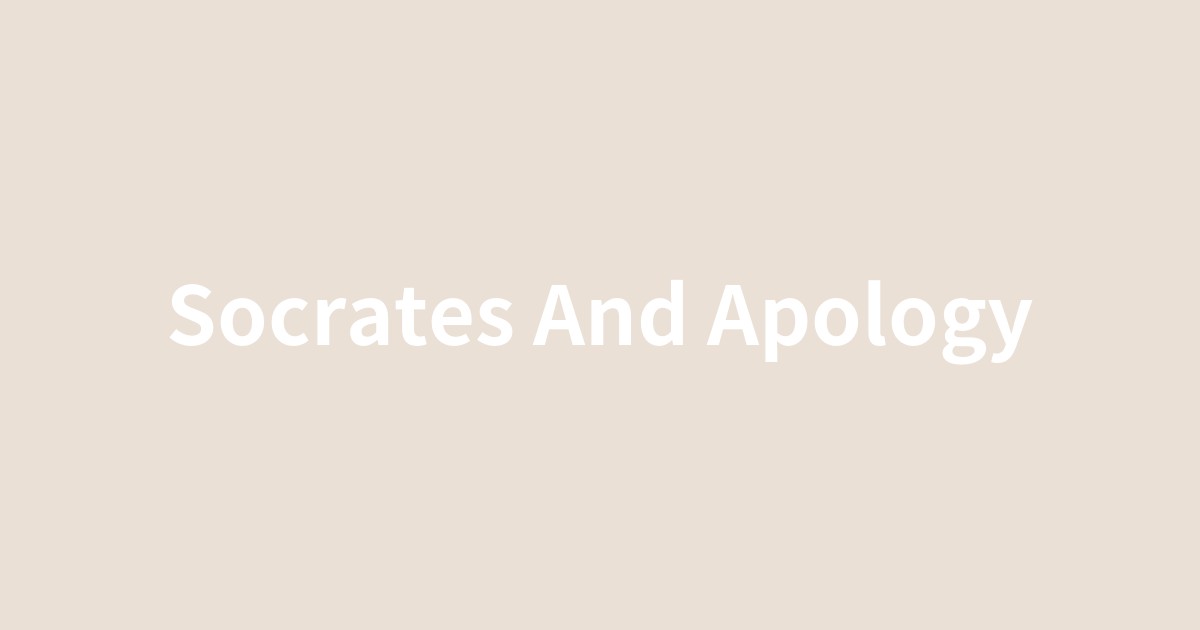このページは、歴史や文化の物語を楽しみながら、その文脈の中で重要な英単語を自然に学ぶための学習コンテンツです。各セクションの下にあるボタンで、いつでも日本語と英語を切り替えることができます。背景知識を日本語で学んだ後、英語の本文を読むことで、より深い理解と語彙力の向上を目指します。

「私は自分が何も知らないことを知っている」。アテネの街角で人々に問いかけ続けたソクラテス。彼のdialogue(対話)とvirtue(徳)の探求を追体験します。
この記事で抑えるべきポイント
- ✓「無知の知」とは、単に「知らないことを自覚する」だけでなく、それを探求の出発点とする謙虚な姿勢、つまり「知を愛し求める(philosophia)」態度そのものであるという点。
- ✓ソクラテスの対話術(問答法)の目的は相手を論破することではなく、対話を通じて相手自身に矛盾を気づかせ、無知を自覚させ、より善く生きるための「魂の世話」を促すことにあったとされる点。
- ✓「徳は知である」というソクラテスの倫理観。人間は本当に善いことが何かを知っていれば、必ず善い行いをすると考え、悪行は無知から生じると捉えていたという見方。
- ✓ソクラテスが当時のアテネ社会で異端視され、告発されて死刑に至った背景には、彼の哲学的な探求が既存の権威や価値観を揺るがすものと見なされたという社会的・政治的文脈があること。
「無知の知」とは何か ― 賢者ソクラテスの対話術
「自分は物事を正しく理解している」という確信は、時に私たちの思考を停止させてしまうかもしれません。古代アテネに、自らの「無知」を公言し、街の人々に根源的な問いを投げかけ続けた哲学者がいました。彼の名はソクラテス。本記事では、この賢者の有名な言葉「私は自分が何も知らないことを知っている」の真意を探り、彼の対話術と思想の核心に迫ります。それは単なる知識の有無を超えた、真の知を愛し求める哲学(philosophy)そのものでした。
What is "I know that I know nothing"? - The Dialogue of Socrates the Wise
The conviction that "I understand things correctly" can sometimes bring our thinking to a halt. In ancient Athens, there was a philosopher who declared his own ignorance and continued to ask fundamental questions to the people of the city. His name was Socrates. In this article, we will explore the true meaning of this wise man's famous words, "I know that I know nothing," and delve into the core of his method of dialogue and thought. It was the very essence of philosophy, the love and pursuit of true wisdom, that went beyond the mere presence or absence of knowledge.
「汝自身を知れ」― 神託が告げた最も賢い男
ソクラテスの探求は、ある神託(oracle)から始まりました。彼の友人がデルフォイの神殿で「ソクラテス以上の知者はいるか」と尋ねたところ、「誰一人いない」という答えが返ってきたのです。この神託の意味を解明するため、ソクラテスはアテネで知恵(wisdom)があると評判の政治家や詩人、職人たちを訪ね、対話を重ねます。すると、彼らは自分が知らないことまで知っていると思い込んでいることに気づきました。一方、ソクラテスは自分が知らないことを自覚していました。この一点においてのみ、自分は彼らより賢いのかもしれない。こうして彼は、自らの無知を自覚することこそが真の知への第一歩である、という「無知の知」の境地に至ったのです。
"Know thyself" - The Wisest Man According to the Oracle
Socrates's quest began with an oracle. When his friend asked at the temple of Apollo at Delphi if there was anyone wiser than Socrates, the answer came back that there was no one. To understand the meaning of this oracle, Socrates visited and engaged in dialogue with politicians, poets, and artisans in Athens who were reputed to have wisdom. He discovered that they all believed they knew things they did not actually know. Socrates, on the other hand, was aware of what he did not know. In this one respect, he thought, perhaps he was wiser. Thus, he arrived at the state of "knowing his own ignorance," realizing that acknowledging one's lack of knowledge is the first step toward true wisdom.
なぜソクラテスは問い続けたのか? ― 対話術の真の目的
ソクラテスの代名詞とも言えるのが、問いと答えを繰り返す対話(dialogue)の手法、いわゆる「問答法」です。しかし、彼の目的は相手を論破し、やり込めることではありませんでした。その真の目的は、人々の魂(soul)をより善い状態へと導く「魂の世話」にあったと言われています。彼は粘り強い問いかけを通じて、相手が自身の意見に含まれる矛盾や無自覚な前提に気づく手助けをしました。それは、母親から赤ん坊が生まれるのを手伝う産婆のように、相手の中から真理が生まれるのを助ける営みでした。このため、彼の対話術は「産婆術」とも呼ばれます。
Why Did Socrates Keep Questioning? - The True Purpose of Dialogue
Synonymous with Socrates is his method of dialogue, a process of repeated questions and answers, often called the Socratic method. However, his goal was not to defeat or corner his interlocutor. The true purpose is said to have been the "care of the soul," guiding people's soul to a better state. Through persistent questioning, he helped others recognize the contradictions and unconscious assumptions within their own opinions. It was a process akin to a midwife helping a mother give birth, assisting in the birth of truth from within the other person. For this reason, his method of dialogue is also known as "maieutics" or intellectual midwifery.
善く生きるとは何か ― 「徳は知なり」という思想
ソクラテスの哲学(philosophy)が目指した最終的なゴールは、人間にとって「善く生きる」とは何かを明らかにすることでした。そして、善く生きるために不可欠なものが「徳(virtue)」であると考えました。勇気、正義、節制といった徳とは一体何なのか。この問いこそが彼の探求の中心でした。そして彼は「徳は知識(knowledge)である」という、有名な命題を打ち立てます。これは、何が本当に善いことかを正しく知っていれば、人は必ず善い行いをせざるを得ない、という考え方です。彼によれば、人が悪事を働くのは、それが本当は自分にとって悪いことだと知らない「無知」が原因なのです。
What Does It Mean to Live Well? - The Idea that "Virtue is Knowledge"
The ultimate goal of Socrates's philosophy was to clarify what it means for a human being to "live well." He believed that virtue was essential for living well. What exactly are virtues like courage, justice, and temperance? This question was central to his inquiry. He then famously proposed that "virtue is knowledge." This is the idea that if a person truly knows what is good, they will inevitably do good. According to him, people commit evil deeds out of "ignorance," not knowing that such actions are truly bad for them.
哲学者の最期 ― なぜソクラテスは告発されたのか
ソクラテスの活動は、既存の権威や常識を揺るがすものでした。そのため、彼はアテネの社会にとって危険な存在と見なされるようになります。紀元前399年、彼は「国家が信じる神々を認めず、若者を堕落させている」という罪状で告発(accusation)を受け、裁判にかけられました。裁判で有罪となり死刑を宣告された後、友人は彼に逃亡を勧めます。しかしソクラテスは、それをきっぱりと拒絶しました。国家との契約であるアテネの法(law)に従うことは市民の義務であり、不正に報いるに不正をもってすべきではない、と。自らの信念を貫き、毒杯を仰いだ彼の最期は、哲学が単なる言葉の遊びではなく、生き方そのものであることを後世に強く印象付けました。
The Philosopher's End - Why Was Socrates Accused?
Socrates's activities challenged existing authorities and common sense. Consequently, he came to be seen as a threat to Athenian society. In 399 BC, he faced an accusation on charges of "not believing in the gods of the state and corrupting the youth," and was put on trial. After being found guilty and sentenced to death, his friends urged him to escape. However, Socrates flatly refused. He argued that obeying the law of Athens, a contract with the state, was a citizen's duty, and that one should not respond to injustice with injustice. His final moments, where he upheld his beliefs and drank the hemlock, strongly impressed upon later generations that philosophy is not merely a game of words, but a way of life itself.
結論
ソクラテスの「無知の知」は、知の探求を諦める思考停止ではありません。むしろ、それは自らの限界を認め、無限の探求へと乗り出すための謙虚な出発点です。情報が溢れ、誰もが簡単に「知っているつもり」になれる現代社会において、常識を疑い、根源的な問いを投げかけ続けたソクラテスの姿勢は、私たちに極めて重要な示唆を与えてくれます。本当に大切なことを見失わないために、私たちもまた、彼のように問い続ける勇気を持つべきなのかもしれません。
Conclusion
Socrates's "I know that I know nothing" is not an intellectual dead-end that gives up on the pursuit of knowledge. Rather, it is a humble starting point for embarking on an infinite quest by admitting one's own limitations. In our modern society, flooded with information where anyone can easily feel that they "know," the attitude of Socrates, who constantly questioned common sense and posed fundamental questions, offers us extremely important insights. To avoid losing sight of what is truly important, perhaps we, too, should have the courage to keep questioning as he did.
テーマを理解する重要単語
soul
ソクラテスの対話術の真の目的、「魂の世話」を理解するための鍵となる単語です。彼にとって哲学とは、知識を蓄えることではなく、人々の魂をより善い状態へと導く実践的な営みでした。この言葉から、彼の思想の倫理的な側面を深く読み取ることができます。
文脈での用例:
He believed that music could soothe the human soul.
彼は音楽が人の魂を癒すことができると信じていた。
law
ソクラテスが逃亡を拒否し、死を受け入れた理由を理解するための鍵です。彼は国家との契約であるアテネの「法」に従うことが市民の義務だと考え、不正に不正で報いるべきではないと主張しました。彼の哲学が生き方そのものであったことを象徴する場面で使われます。
文脈での用例:
Every citizen has a duty to obey the law.
すべての市民には法に従う義務がある。
fundamental
ソクラテスが人々に投げかけた「根源的な問い」の本質を表す形容詞です。彼は表面的な事柄ではなく、正義や徳といった物事の「根本」を問い続けました。現代社会で常識を疑うことの重要性を説く、この記事の結論部分のメッセージとも強く結びついています。
文脈での用例:
A fundamental change in the company's strategy is needed.
その会社の方針には根本的な変更が必要だ。
knowledge
「知恵(wisdom)」と対比して理解することが重要な単語です。ソクラテスは「徳は知識である」と述べ、何が善かを正しく知ることの重要性を説きました。一方で、知っていると思い込むことの危険性も指摘しており、彼の哲学における「知」の多面性を表しています。
文脈での用例:
The library is a treasure trove of human knowledge.
図書館は人類の知識の宝庫です。
virtue
ソクラテス哲学の最終目標である「善く生きる」ために不可欠な要素として登場します。彼が「徳は知なり」と述べたように、勇気や正義といった「徳」の本質を知ることこそが、善い行いに繋がると考えました。彼の思想のゴールを理解する上で極めて重要です。
文脈での用例:
For the Romans, courage in the face of death was a great virtue.
ローマ人にとって、死に直面した際の勇気は偉大な美徳でした。
philosophy
記事の主題そのものである「哲学」を指す最重要単語です。この記事では、ソクラテスの探求が単なる知識の有無を超えた「真の知を愛し求める営み」そのものであったことを示しています。この単語を理解することが、彼の思想の核心に迫るための第一歩となります。
文脈での用例:
He studied Greek philosophy and its influence on Western thought.
彼はギリシャ哲学と、それが西洋思想に与えた影響を研究した。
dialogue
ソクラテスの代名詞である「問答法」を指す単語です。彼の対話は相手を論破するためではなく、相手自身が真理に気づく手助けをする「魂の世話」が目的でした。この記事におけるソクラテスの人物像と彼の哲学的手法を理解する上で中心的な役割を果たします。
文脈での用例:
Constructive dialogue is essential for resolving international conflicts.
国際紛争を解決するためには、建設的な対話が不可欠だ。
wisdom
単なる「知識(knowledge)」とは区別される「知恵」を意味します。ソクラテスが探求したのは、情報量の多さではなく、物事の本質を見抜く深い洞察力でした。彼がアテネの賢者たちと対峙する場面で、この二つの「知」の違いが鮮明になります。
文脈での用例:
He shared his words of wisdom with the younger generation.
彼は若い世代に知恵の言葉を分け与えた。
ignorance
記事の中心概念「無知の知(knowing one's own ignorance)」の核となる単語です。ソクラテスは、自分が知らないことを自覚している点で他の賢者より優れていると考えました。この「無知」の自覚こそが、真の知恵への出発点であるという、彼の思想の根幹をなしています。
文脈での用例:
His decisions were based on ignorance of the true facts.
彼の決定は、真実を知らない無知に基づいていた。
conviction
記事冒頭で「思考を停止させる確信」として登場し、問題提起の役割を果たします。また、法廷での「有罪判決」の意味もあります。ソクラテス自身が強い「信念」を貫いて死んだことと対比され、この単語が持つ複数の意味が記事全体に深みを与えています。
文脈での用例:
She spoke with great conviction about her political beliefs.
彼女は自らの政治的信条について、大いなる確信を持って語った。
accusation
ソクラテスが死刑に至る経緯を説明する上で不可欠な単語です。「若者を堕落させている」という罪状で告発された彼の最期は、既存の権威を揺るがす彼の思想がいかに危険視されていたかを示しています。哲学者の生き様を劇的に伝える重要な言葉です。
文脈での用例:
He was arrested based on an anonymous accusation.
彼は匿名の告発に基づいて逮捕された。
oracle
ソクラテスの探求のきっかけとなった「デルフォイの神託」を指します。この神のお告げの意味を解明しようとする彼の行動が、「無知の知」という境地に至る物語の起点となっています。この記事のドラマチックな展開を理解する上で欠かせない単語です。
文脈での用例:
In ancient Greece, people would travel to Delphi to consult the oracle.
古代ギリシャでは、人々は神託を授かるためにデルフォイへ旅をした。